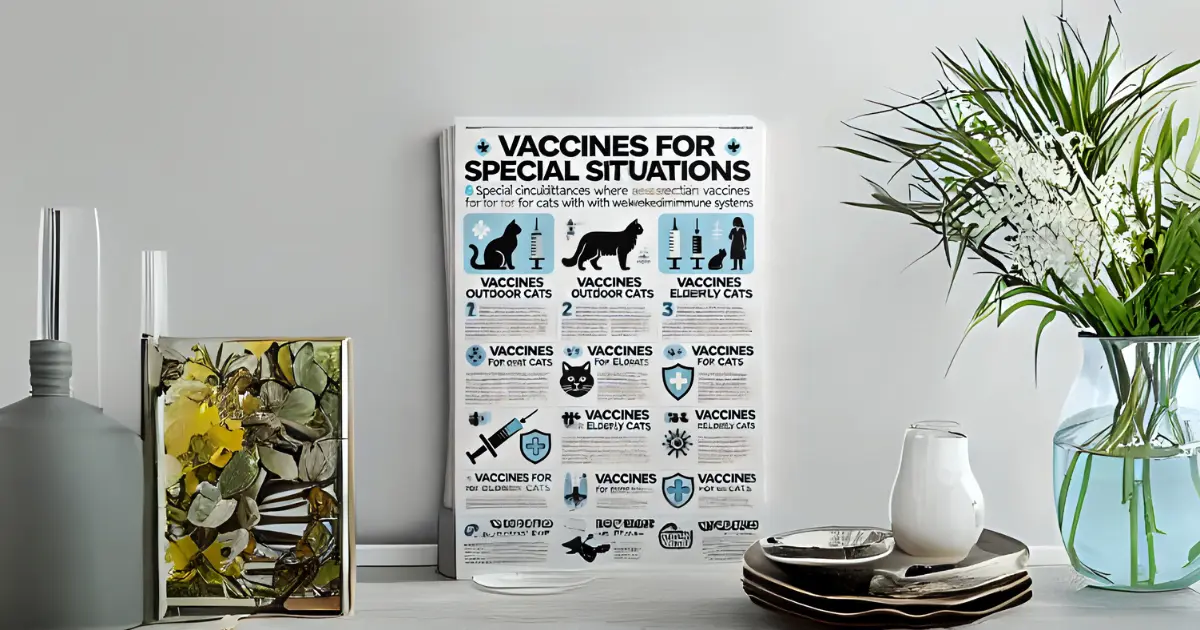The Ultimate Guide to Your Cat Vaccination Schedule
Published: 23 Jan 2025
As a cat parent, one of your top priorities is keeping your feline friend healthy and happy. Like us, cats need vaccinations to protect them from potentially life-threatening diseases. Keeping Track of Your Cat’s Vaccines will walk you through when to start, what vaccines are essential, and how to protect your cat as they grow. Let’s keep it simple and break it down step by step so you can give your cat the best care possible.

Table of Contents
Why Vaccinating Your Cat is So Important
Think of vaccines as your cat’s superhero shield. They help train your cat’s immune system to recognize and fight off dangerous illnesses before they even have a chance to take hold. Plus, keeping up with their vaccines doesn’t just protect their health—it can save you a lot of stress (and money) on costly treatments.
Kitten Vaccination Schedule: The First-Year
Bringing a kitten into your home is such an exciting experience! They’re full of energy and adorable little furballs that will quickly steal your heart. But along with all the cuddles and playtime, you also take on the responsibility of ensuring your kitten stays healthy and happy as they grow.
Kittens are born with some immunity from their mom’s milk, but that doesn’t last forever. Here’s when and what vaccines your kitten will need to set them up for a lifetime of health.
8-9 Weeks
At this age, your kitten will receive the core vaccines (FVR, FCV, FPL) that protect against Feline Viral Rhinotracheitis, Calicivirus, and Panleukopenia—three nasty diseases that can really hurt your kitten. These vaccines are necessary for all cats, no matter where they live.
Depending on where you live, your kitten might also get its first rabies vaccine at this time—though in some places, it’ll be done a bit later, around 12-16 weeks.
12 Weeks
Around 12 weeks, it’s time for the Feline Leukemia Virus (FeLV) vaccine. This one is super important if your kitten is going outdoors or lives with other unvaccinated cats. If your kitten is a homebody (aka stays indoors), this vaccine might not be necessary, but it’s always worth discussing with your vet.
16 Weeks
Your kitten will get a booster shot for the core vaccines (FVR, FCV, FPL) to ensure it’s fully protected and has strong immunity for the years ahead.
Adult Cat Vaccination Schedule: Keeping That Protection Going
Once your kitten becomes an adult, their vaccine schedule shifts slightly, but staying on top is just as important. After those first few rounds, adult cats still need regular boosters to keep their immune system in tip-top shape.
1 Year After Their Initial Shots
When your kitten hits that one-year mark, they’ll need a booster shot for the core vaccines (FVR, FCV, FPL). Some vaccines require an annual booster, while others might be good for up to three years, depending on your vet’s recommendation.
The rabies vaccine is usually required by law in most places, so your cat will also need this booster—generally every 1 to 3 years.
Every 1-3 Years
For Feline Leukemia (FeLV), this booster shot is typically recommended for cats outdoors or exposed to unvaccinated cats. If your cat is indoor-only, you may not need to worry about it unless its lifestyle changes.

Vaccines for Special Situations
Not all cats live the same lifestyle, so some might need extra protection. If your cat’s world involves a lot of social interaction (think shelters, boarding facilities, or multiple cats at home), consider these additional vaccines:
Chlamydia Psittaci:
- This vaccine helps protect against respiratory infections, especially in multi-cat households or if your cat frequently interacts with others.
Bordetella bronchiseptica:
- Consider this the “kennel cough” for cats. It’s recommended for cats who visit boarding facilities, grooming salons, or cat shows.

Keeping Track of Your Cat’s Vaccines
Staying on top of your cat’s vaccinations is easier than it seems. Keep a copy of their vaccine record (ask your vet for one!) so you’ll always know when they’re due for their next shot. It’s convenient if you’re traveling or boarding your cat, as some places will ask for proof of up-to-date vaccines.Speaking of traveling, don’t forget to check out our tips on traveling with a cat in the car to make those trips stress-free
Key Takeaways About Cat Vaccines
1. Stay on Schedule:
Vaccines are most effective when given on time, so try not to skip appointments or delay any doses. Doing so could leave your cat at risk for illness, and we don’t want that.
2. Side Effects:
Most cats breeze through vaccines without any issues, but a few might have a mild reaction—maybe a sore spot at the injection site or a slight fever. Check-in with your vet if your cat seems unwell for over a day or two.
3. Vet Visits Are Essential:
- Even if your cat’s vaccines are up to date, don’t skip those routine checkups. Regular visits are the best way to catch any potential health issues early.If you’re looking for more tips on cleaning your cat’s teeth, it’s a great complement to their overall health care!
Final Thoughts
Vaccinations are one of the most important things you can do for your cat’s health. From their first kitten shots to boosters throughout adulthood, these vaccines help keep them safe from dangerous diseases. Staying on top of their vaccination schedule and regular vet checkups is the best way to ensure your furry friend lives a long, healthy life.And if you ever wonder about why your cat is suddenly kneading their blanket or you want to explore ways to care for a long-haired cat, we’ve got you covered there too!
For comprehensive advice on general cat care, check out the American Veterinary Medical Association’s Cat Care Guidelines.”
How’s your cat doing with its vaccines? Does it love vet visits or prefer to hide under the couch? Let me know your thoughts, and share your experiences in the comments!
FAQ
1. How long does it take for my cat to develop immunity after vaccination?
Once your cat gets its vaccination, it usually takes about 1-2 weeks for its body to fully build up immunity. During this time, it’s a good idea to keep it away from potentially sick animals just to be safe.
2. Can I vaccinate my cat myself?
While some vaccines might seem simple enough to administer, it’s best to leave it to the pros at the vet. They’ll ensure your cat gets the correct dose the right way and keep an eye out for any side effects.
3. Is it safe to vaccinate a sick cat?
If your cat is feeling under the weather, it’s best to wait until it’s feeling better before getting vaccinated. Their immune system is already working hard to fight off illness, so it’s best not to stress it out further with a vaccine.
4. Do indoor cats need vaccinations?
Yes, even though your indoor cat might seem safe from outside germs, they still need vaccinations. Accidents can happen, like your cat sneaking out or coming in contact with other animals, and you want them protected.
5. What happens if I miss my cat’s vaccination booster?
If you miss a booster, your cat might not be fully protected. It’s a good idea to schedule the booster as soon as you can, and your vet will guide you on what to do next to ensure your cat’s safety.
6. How often should I get my cat’s teeth cleaned?
Aim for a professional cleaning every 6-12 months, but brushing your cat’s teeth at home can help keep things in check between cleanings. If you notice bad breath or tartar buildup, it might be time for a checkup.
7. Can vaccinations cause behavioral changes in cats?
It’s rare, but some cats might feel slightly off after their shots, like being sleepy or grumpy. Don’t worry, though—these reactions usually go away after a day or two.
8. Do older cats need to be vaccinated?
Yes! Even senior cats still need regular shots to stay protected, especially from serious diseases. Your vet can adjust the schedule based on your cat’s age and health needs, so they’re covered without overdoing it.
9. Can my cat get sick from a vaccine?
Most cats handle vaccines like champs, but there’s always a small chance of mild side effects, like a slight swelling at the injection site or a slight fever. If something seems off, don’t hesitate to ask your vet for advice.
10. Should I vaccinate my cat if they’re pregnant?
It’s usually best to hold off on vaccinations during pregnancy to be safe. Talk to your vet about the best options for your pregnant cat to ensure that she and her kittens stay healthy.

- Be Respectful
- Stay Relevant
- Stay Positive
- True Feedback
- Encourage Discussion
- Avoid Spamming
- No Fake News
- Don't Copy-Paste
- No Personal Attacks



- Be Respectful
- Stay Relevant
- Stay Positive
- True Feedback
- Encourage Discussion
- Avoid Spamming
- No Fake News
- Don't Copy-Paste
- No Personal Attacks





